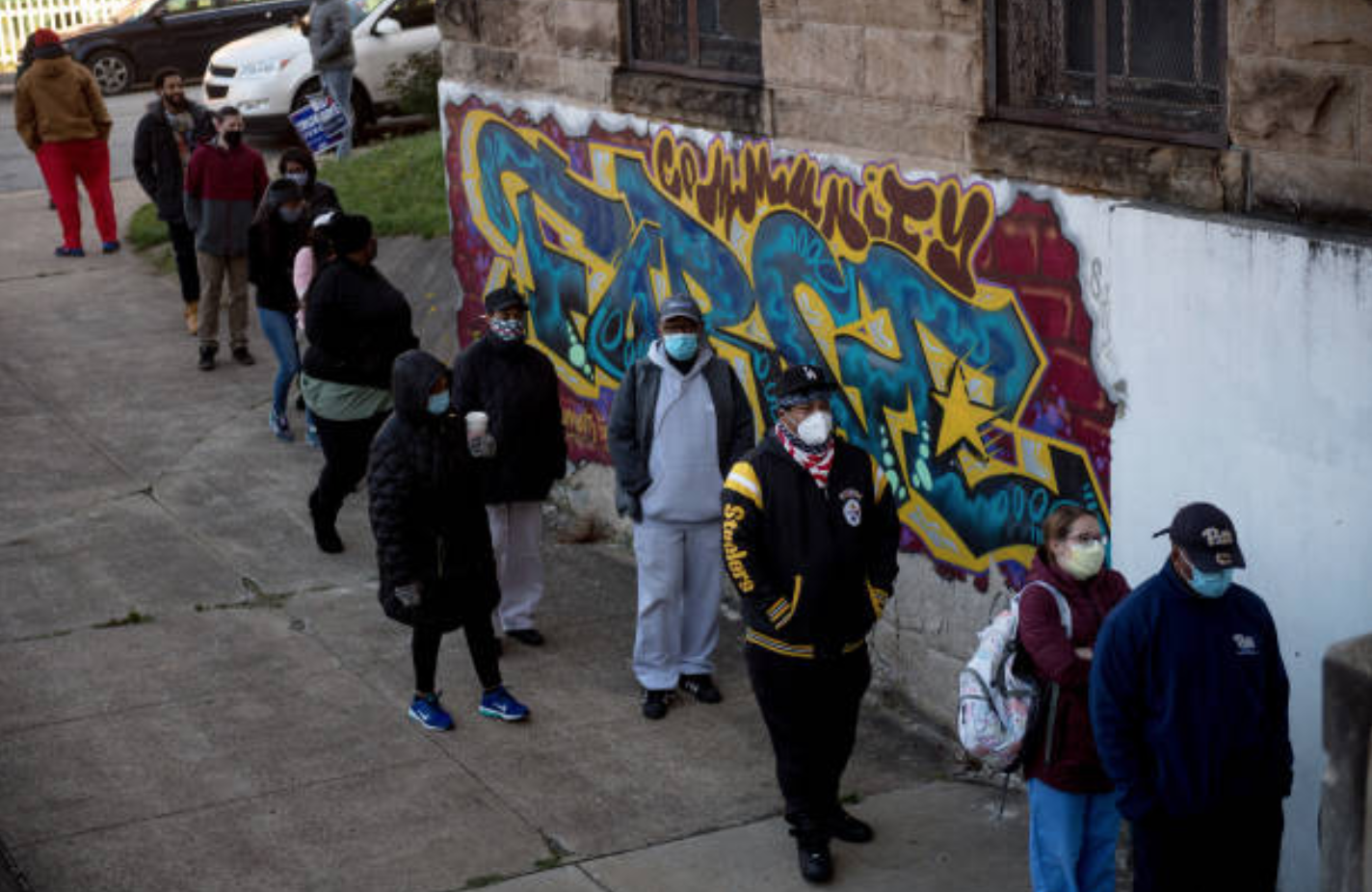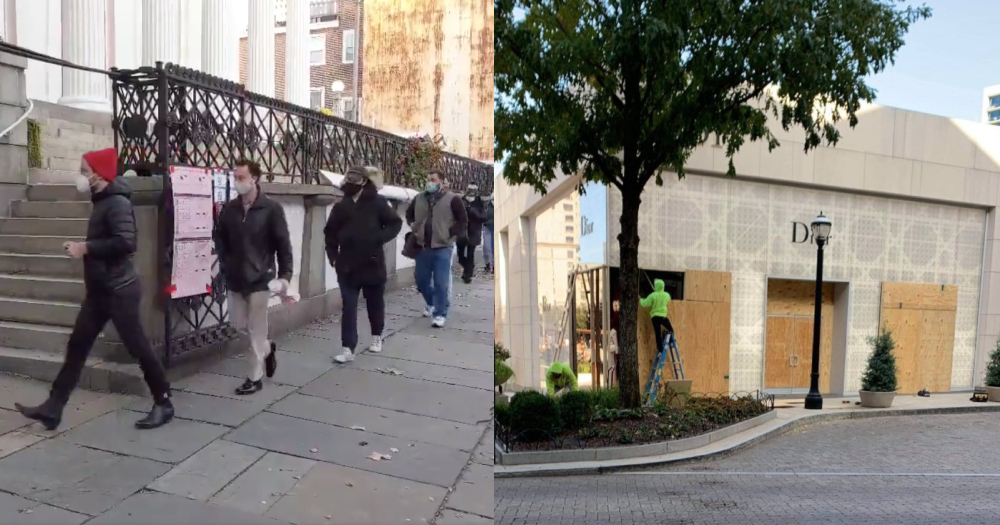Americans are heading to the polls on Tuesday, Nov. 3 (Wednesday, Nov. 4, Singapore time).
As not all mail-in ballots are counted by the time polls close, the final result might take days, even weeks, to determine.
But one thing that's for certain is that this election is like no other.
Voting amid a pandemic
Besides being one of the most divisive presidential races so far, the U.S. election this year is held amid a pandemic that has infected 9 million people and claimed more than 230,000 lives.
While most states have not made it mandatory for voters to wear masks, they have issued advisories to wear face coverings and to observe social distancing, AP reported.
Echoing scenes across the eastern United States early on #ElectionDay, a long line of voters was seen at an elementary school in St. Louis, Missouri. https://t.co/XMV4tSv7rx pic.twitter.com/SIa9a9vaZZ
— ABC News (@ABC) November 3, 2020
 Voters wait to cast their ballots at Johnston Elementary School in the Wilkinsburg neighborhood on Nov. 3, 2020 in Pittsburgh, Pennsylvania. After a record-breaking early voting turnout, Americans head to the polls on the last day to cast their vote for incumbent U.S. President Donald Trump or Democratic nominee Joe Biden in the 2020 presidential election. (Photo by Jeff Swensen/Getty Images)
Voters wait to cast their ballots at Johnston Elementary School in the Wilkinsburg neighborhood on Nov. 3, 2020 in Pittsburgh, Pennsylvania. After a record-breaking early voting turnout, Americans head to the polls on the last day to cast their vote for incumbent U.S. President Donald Trump or Democratic nominee Joe Biden in the 2020 presidential election. (Photo by Jeff Swensen/Getty Images)
Unprecedented early vote
The number of voters who have already cast their ballots for their choice of president, which is more than 99 million voters, has also reached nearly three-quarters of the number of votes cast in the 2016 election.
This unprecedented wave of early voting puts the country on course for perhaps the biggest turnout in U.S. history.
A divided nation
The electorate is also highly polarised over a number of issues, such as the Trump administration's response to the pandemic, as well as issues of racial inequality sparked by the death of African American man George Floyd.
But most could agree on one thing.
As many as three-quarters of Americans say that the country is more divided than before the Covid-19 outbreak, according to Pew Research Centre, a nonpartisan think tank.
Bracing for election unrest
Anxiety has been building for months, with the effect being that no matter who wins, the election results could spark civil unrest.
A scenario planning exercise by Transition Integrity Project, which is made up of a bipartisan group of former officials, projected that every scenario other than a Biden landslide would translate to "street-level violence and political crisis".
The situation is made worse as incumbent Trump has hinted at not accepting the results of the election if he loses.
As election day neared, Trump said: "As soon as that election is over, we're going in with our lawyers."
He has also said previously that any outcome other than a victory for him would have to have been rigged.
Trump has also stood by the actions of a group of his supporters who surrounded a Joe Biden campaign bus on a Texas highway.
In my opinion, these patriots did nothing wrong. Instead, the FBI & Justice should be investigating the terrorists, anarchists, and agitators of ANTIFA, who run around burning down our Democrat run cities and hurting our people! https://t.co/of6Lna3HMU
— Donald J. Trump (@realDonaldTrump) November 2, 2020
Stores boarding up
Businesses are bracing for potential unrest on the streets post election.
Many retail stores, including pharmacy chain CVS and luxury jeweller Tiffany & Company, have been boarded up to prepare for possible rioting or looting, AFP reported.
Happening now - store fronts being boarded up in downtown DC ahead of the election. This is the National Press Building near the White House. @nbcwashington pic.twitter.com/FWd8mK8ZkL
— Adam Tuss (@AdamTuss) October 28, 2020
https://twitter.com/FromKalen/status/1322255968307191808
The same sort of preparation was also taken back in June in anticipation of Black Lives Matter demonstrations that could potentially turn violent.
Drawn-out court battle
While final polls before the election have shown that Biden is ahead of Trump in enough swing states to win, his lead in certain states like North Carolina is narrower and within the margin of error, which means Trump still has a shot at victory.
Anything short of a clear-cut outcome could also lead to legal action being taken.
Already, legal disputes are underway in some states over which votes to accept, such as ballots with missing signatures or unclear postmarks.
A federal judge in Texas has ruled that more than 127,000 ballots cast at newly set up drive-through polling stations could not be tossed out.
The undermining of the legitimacy of ballots has been criticised by detractors such as Dale Ho, director of Voting Rights Project, who said it is "the most blatant, open attempt at mass disenfranchisement of voters" he has ever seen, New York Times reported.
Totally unrelated but follow and listen to our podcast here
Top image adapted via @mtgreenee & @BVKImages on twitter
If you like what you read, follow us on Facebook, Instagram, Twitter and Telegram to get the latest updates.
